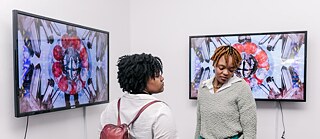Thu, 31.08.2023 -
Mon, 29.01.2024
The exhibition, SENSES, is presented as part of the Young Curators Incubator programme – an initiative conceived by the Goethe-Institut in collaboration with UCT's Michaelis School of Fine Art. The exhibition is curated by Kamogelo Walaza, mentored by Prof. Nomusa Makhubu.
SENSES is a group exhibition that engages with material elements and physicality of 5 Senses. How can taste, touch, smell and sound influence the way we experience art? Here we explore various sensory approaches to exhibition design. A critical point of entry is the potential for ambiguity often associated with abstraction. Our approach is practice-led research and process led research, whereby artists incorporate their creative practice, creative methodologies into the research space.
SENSES is art that you can play with. It is visual, sonic and haptic, inviting interaction and responding to movement and sound. It provides space to think about the convergence of materiality, language and image in Conceptual Art. SENSES will explore the mediums utilised and reflect on Conceptual Art and the significance of process-based creative practice.
Why? Senses is a communal proposition, a call to gather, and to collectively engage a wider audience in an intimate way by appealing to all senses, and not just the visual. This, we hope, will bring the affective resonance of art practice to light, to enable us to 'sense' beyond the surface and what is tactile. This potential of a multisensory exhibition is in creating the possibility of making the audience an integral part of the exhibition.
Curated By: Kamogelo Walaza
Artist: Bonolo Kavula l Brian Montshiwa l Bulumko Mbete l Nkhensari Mkhari l Nyakallo Maleke, Pebofatso Mokoena

